Orchids are some of the most widely cultivated and collected flowers in the world. They are unique, beautiful, and vibrant flowers that draw a lot of attention. Unfortunately, all of this attention has been bad for orchids. Many species have been over harvested for trade and are sold on the black market for large sums. This has absolutely devastated the wild population of many orchid species around the world, including almost all of the rare orchids on this list. To make matters worse, the natural habitats of orchids are threatened by deforestation and other human activities.
Sérapias à Pétales Étroits
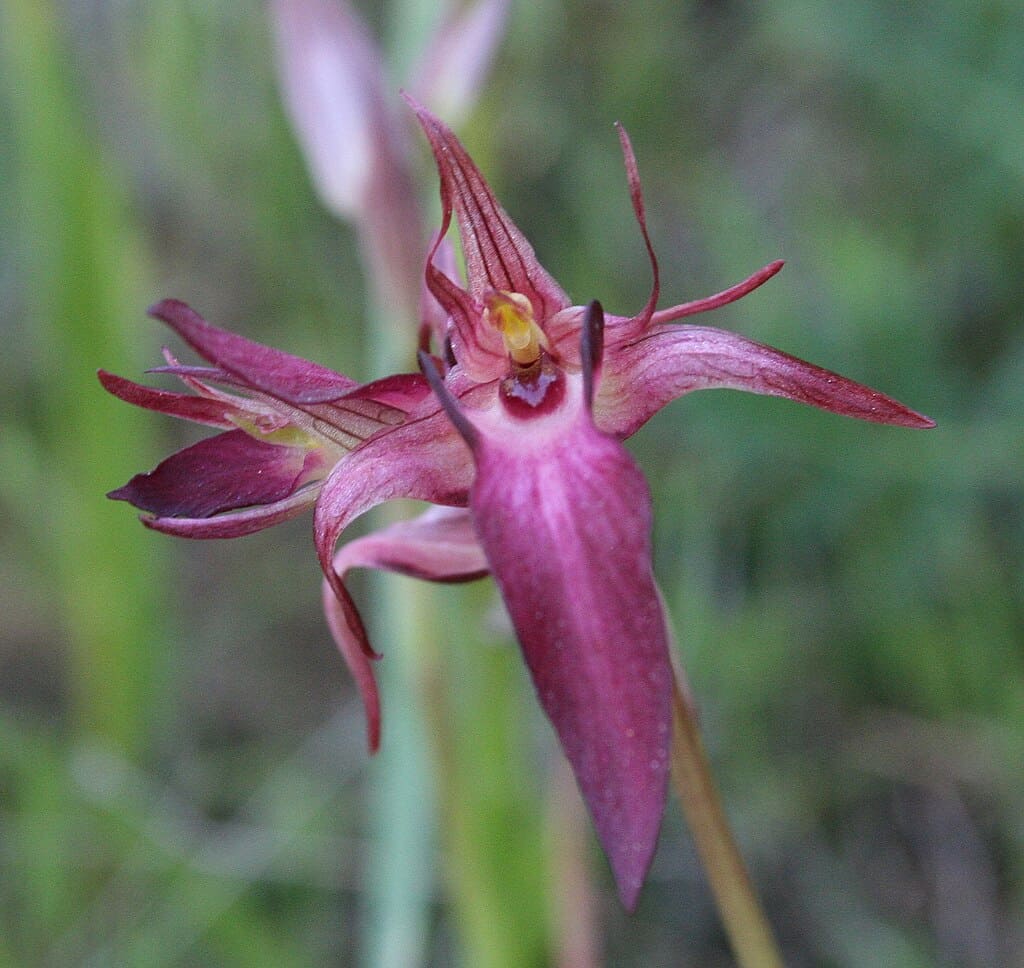
Current Estimated Numbers: fewer than 250
Location (Range): Algeria and Tunisia
Scientific Name: Serapias stenopetala
Conservation Status: Critically Endangered
Sérapias à Pétales Étroits, which is native to Algeria and Tunisia, is a critically endangered orchid that has a very small population. There are only a few sites in both countries where the Sérapias à Pétales Étroits grows and each group is estimated to have fewer than 50 mature plants. The total population of Sérapias à Pétales Étroits is about 250 individuals. Unlike some of the other rare orchids on this list, the Sérapias à Pétales Étroits is really threatened by over collecting (it is kind of plain in comparison to some of the more popular orchids on this list). Instead, the Sérapias à Pétales Étroits is threatened by the destruction of roadside ditches, trampling and grazing by cattle, and the creation of an Animal Park (Brabtia). Although all orchids are included under Annex B of the Convention on International Trade in Endangered Species of Wild Fauna and Flora (CITES) and generally protected, there are no additional conservation programs protecting the Sérapias à Pétales Étroits.
Rothschild’s Slipper Orchid
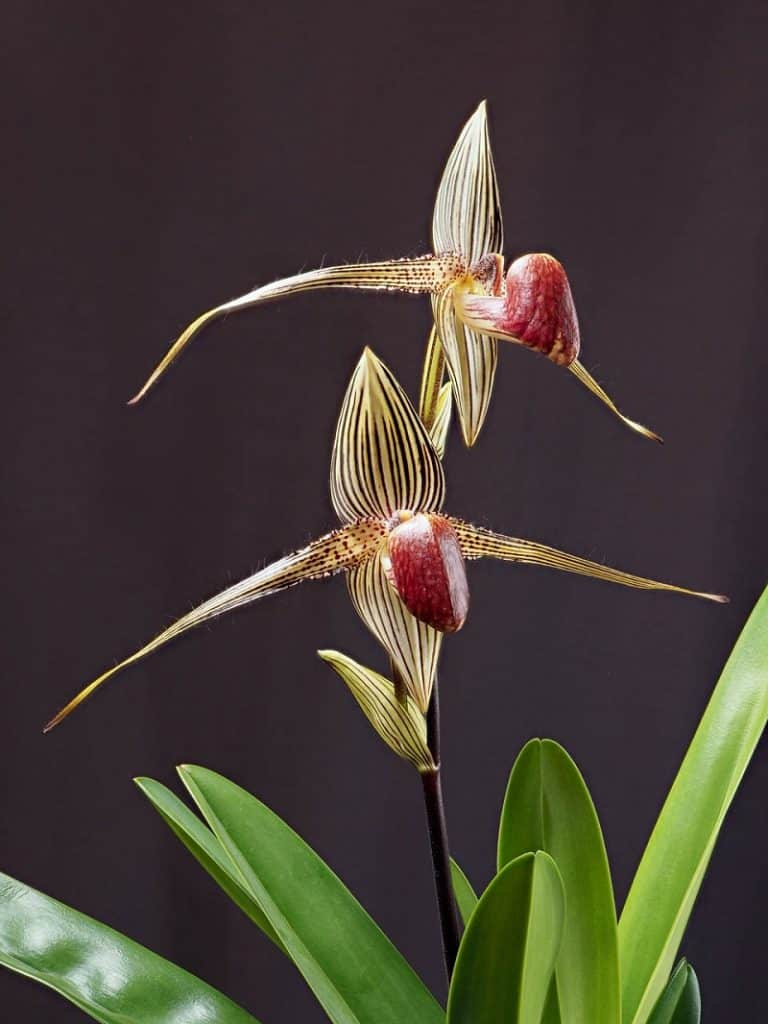
Current Estimated Numbers: fewer than 50
Location (Range): Borneo, Sabah, Malaysia
Scientific Name: Paphiopedilum rothschildianum
Conservation Status: Critically Endangered (CR)
The Rothschild’s Slipper Orchid, also called Gold of Kinabalu Orchid, is one the most highly sought after rare orchids in the world. According to news reports, just one stem of the Rothschild’s Slipper Orchid can fetch up to $5,000 on the black market. Unfortunately, the popularity of the Rothschild’s Slipper Orchid amongst orchid collectors has greatly threatened its status in its native habitat. The Rothschild’s Slipper Orchid only grows Mount Kinabalu in northern Borneo, Malaysia. The IUCN Red List estimates that there are now less than 50 Rothschild’s Slipper Orchids left. Additionally, the IUCN Red List states the although the Rothschild’s Slipper Orchid is very popular, it is still rarely cultivated and most of the plants being sold are coming from the wild population.
Urban’s Paphiopedilum
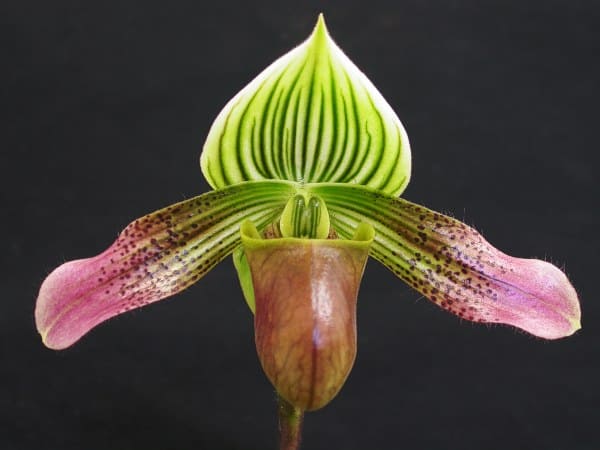
Current Estimated Numbers: fewer than 50; very close to extinction in the wild
Location (Range): Mindoro Island, Philippines
Scientific Name: Paphiopedilum urbanianum
Conservation Status: Critically Endangered (CR)
The Urban’s Paphiopedilum is yet another rare orchid on this list that has nearly gone extinct in the wild because people can’t get enough of this beautiful orchid. According to the IUCN Red List, the population of Urban’s Paphiopedilum has been nearly decimated and reduced by over 95% in the last three generations. In addition to poaching, the Urban’s Paphiopedilum’s biggest threats include habitat degradation, trampling, expansion of settlement areas, deforestation, irregular fires, logging, random cutting, slash-and-burn agriculture, and soil erosion. Currently, it is estimated that there are fewer than 50 remaining Urban’s Paphiopedilum in the wild.
Liem’s Paphiopedilum
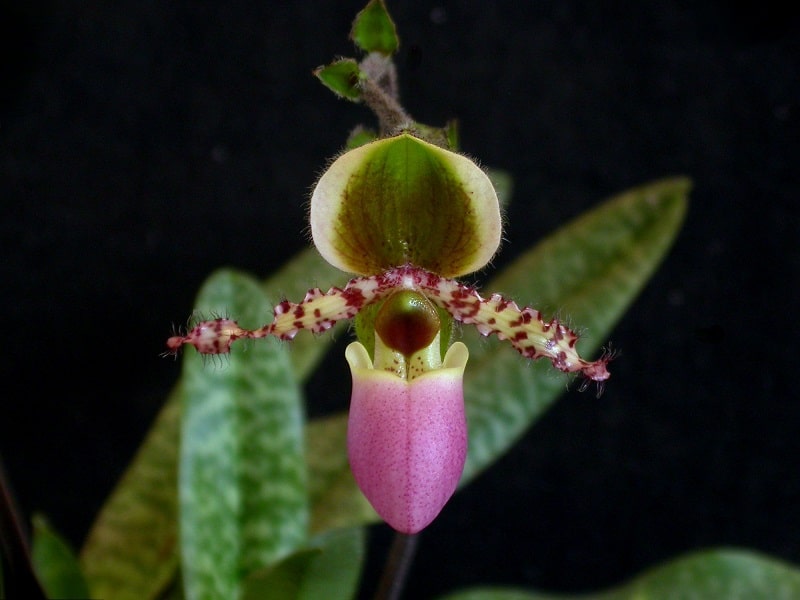
Current Estimated Numbers: fewer than 50
Location (Range): Northern Sumatra, Indonesia
Scientific Name: Paphiopedilum liemianum
Conservation Status: Critically Endangered (CR)
Although Liem’s Paphiopedilum is very close to extinction in the wild, this rare orchid is often available for sale at various online stores or for trading on orchid forums. This popularity is the biggest threat to the Liem’s Paphiopedilum, which is only found in a single 4 km² (1.54 mi²) area in northern Sumatra, Indonesia. In the past, Liem’s Paphiopedilum was abundant, but its population started to sharply decline in the 1971 due to over collecting. Even back then, the Liem’s Paphiopedilum was close to extinction and the wild population has never recovered. Only a few Liem’s Paphiopedilum (fewer than 50) exist in an inaccessible area, which is keeping the orchid from becoming completely extinct.
Sang’s Paphiopedilum
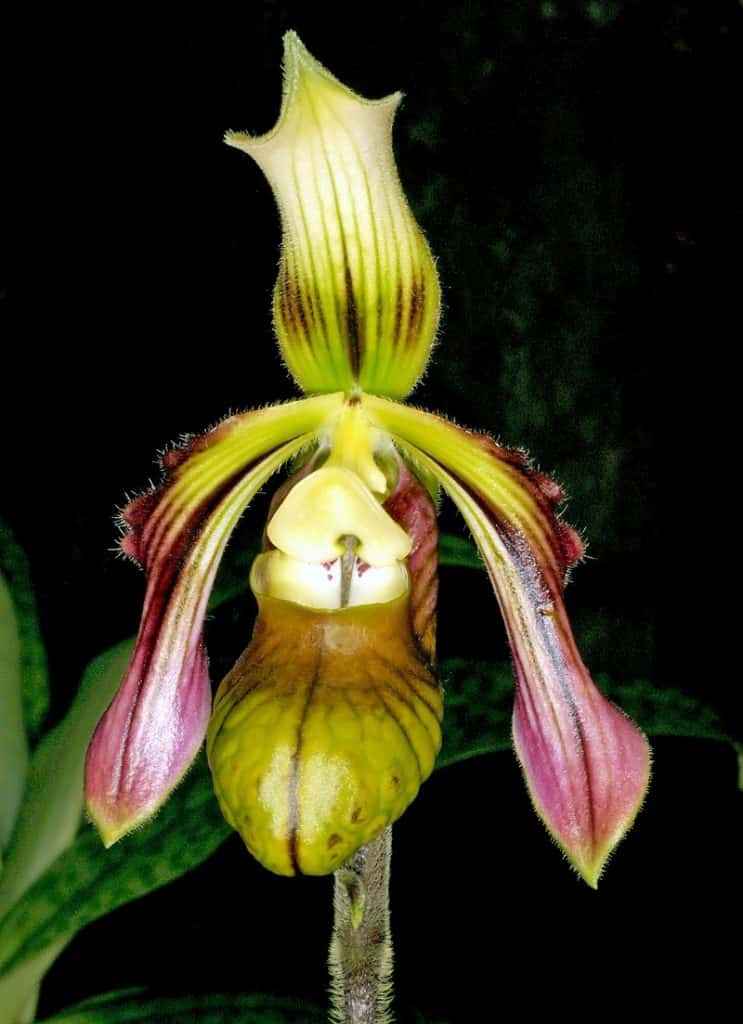
Current Estimated Numbers: fewer than 50
Location (Range): Northern Sulawesi, Indonesia
Scientific Name: Paphiopedilum sangii
Conservation Status: Critically Endangered (CR)
Sang’s Paphiopedilum is a rare orchid native only to the mountainous forests of northern Sulawesi, Indonesia. It is estimated that Sang’s Paphiopedilum only grows in an area that is 8 km² (3.1 mi²) in size. Despite being so difficult to get to, Sang’s Paphiopedilum has been over harvested for regional and international trade. Sang’s Paphiopedilum is also threatened by deforestation, logging, fires, and habitat destruction. According to the IUCN Red List, the wild population of Sang’s Paphiopedilum has declined by about 90% in the last decade. Luckily, the remaining Sang’s Paphiopedilum are in an area that is difficult to reach. For now, this is one of the only things saving this rare orchid from extinction.
Fairrie’s Paphiopedilum
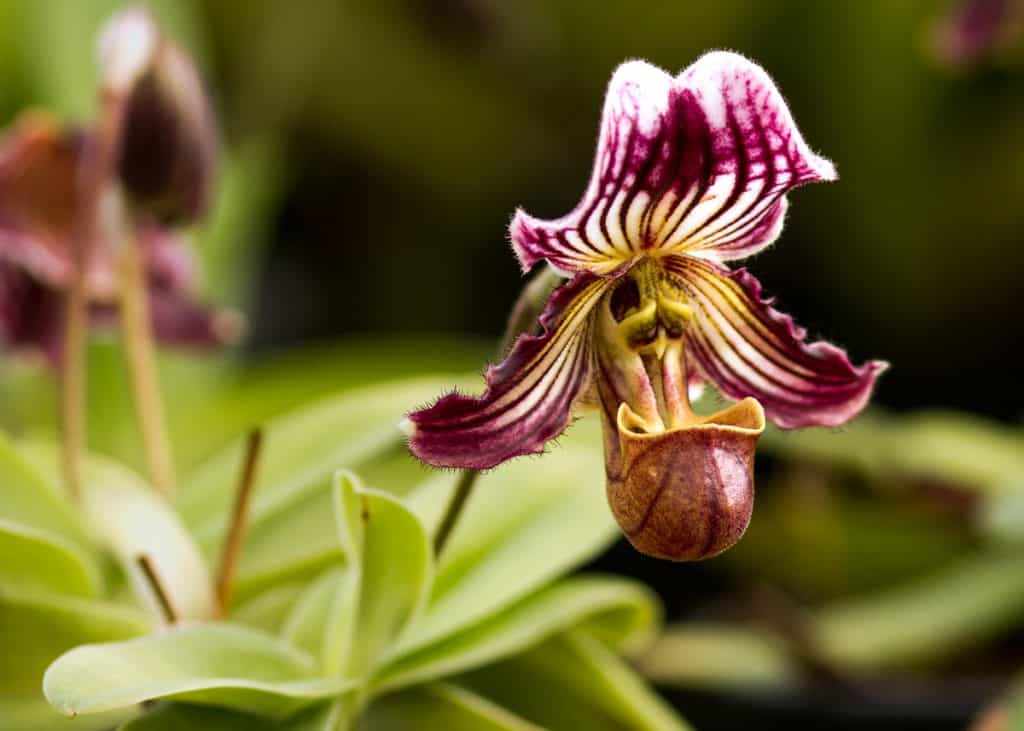
Current Estimated Numbers: fewer than 50
Location (Range): Eastern Himalayas to Assam, India
Scientific Name: Paphiopedilum fairrieanum
Conservation Status: Critically Endangered (CR)
Like many of the rare orchids on the this list the beauty of the Fairrie’s Paphiopedilum is the major cause of its critically endangered status. The Fairrie’s Paphiopedilum has vibrant purple and white petals and yellowish-green markings. These good looks has made the Fairrie’s Paphiopedilum one of the most popularly cultivated orchids around the world. There is high demand for the orchid and unfortunately, the Fairrie’s Paphiopedilum has been over collected from the wild. In the past, the Fairrie’s Paphiopedilum was found in Bhutan as well as India. Today, the only surviving population of Fairrie’s Paphiopedilum is in the eastern Himalayas to Assam. The Fairrie’s Paphiopedilum went extinct in Bhutan not long after it was first discovered in 1904.
Western Underground Orchid
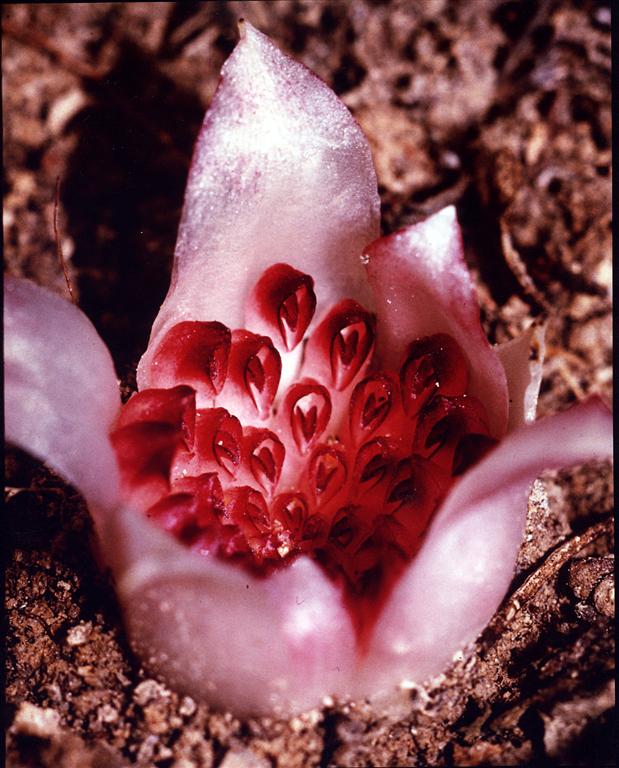
Current Estimated Numbers: fewer than 50
Location (Range): Western Australia
Scientific Name: Rhizanthella gardneri
Conservation Status: Critically Endangered (CR)
The Western Underground Orchid is extremely rare and one of the most unique flowers in the world. Like its name suggests, the Western Underground Orchid spends its entire life underground. This rare orchid even blooms below the dirt. The Western Underground Orchid has no green parts, such as stems and leaves, and does not photosynthesize. Instead, the Western Underground Orchid gets all of its nutrients from a fungi that grows on the roots of the broom bush. It is estimated that there are currently fewer than 50 Western Underground Orchids. Getting an exact count on the population size can be difficult because it often takes hours careful digging to find just one Western Underground Orchid.
Vietnamese Paphiopedilum
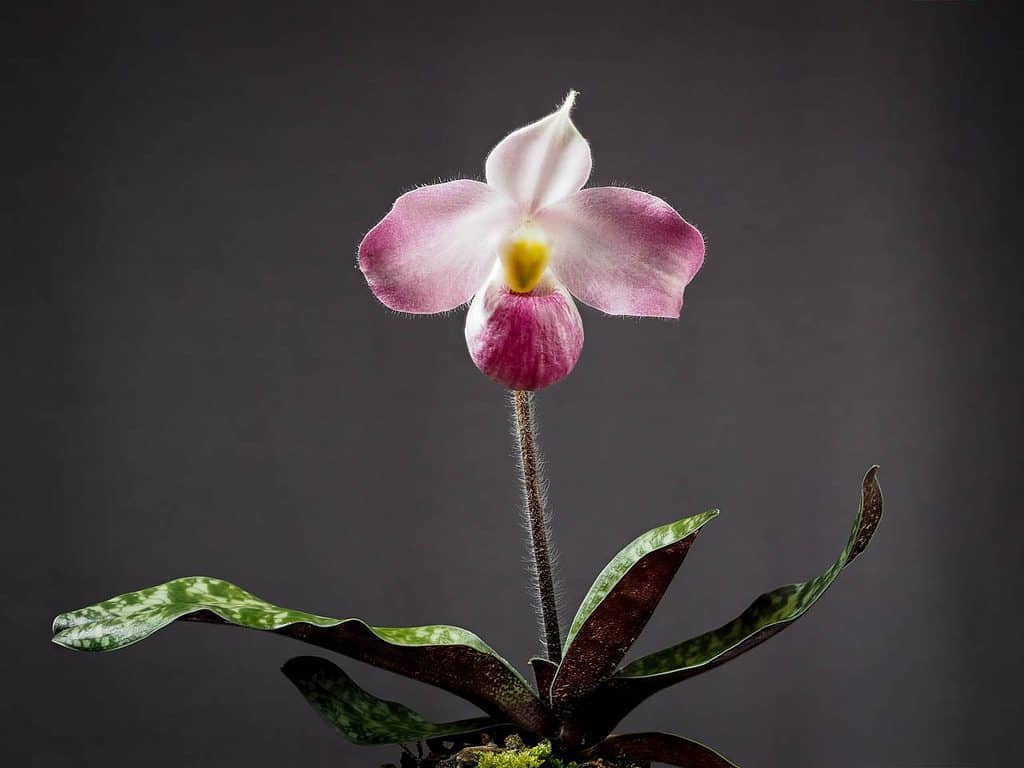
Current Estimated Numbers: possibly extinct in the wild; fewer than 50
Location (Range): Thái Nguyên Province in northern Vietnam
Scientific Name: Paphiopedilum vietnamense
Conservation Status: Critically Endangered (CR)
The Vietnamese Paphiopedilum may already be extinct in the wild, but is still widely grown by orchid collectors around the world. Like most orchids, both the rare ones on this list and species with stronger numbers, the Vietnamese Paphiopedilum is over harvested in the wild. People exploit the Vietnamese Paphiopedilum for horticultural purposes and international trade. The IUCN Red List says that the Vietnamese Paphiopedilum’s population has been reduced by 95% over the last three generations. The last update about the remaining plants was in 2003 and there may be fewer than 50 Vietnamese Paphiopedilum remaining. This rare orchid is only found in Thái Nguyên Province in northern Vietnam.
Hawaiian Bog Orchid
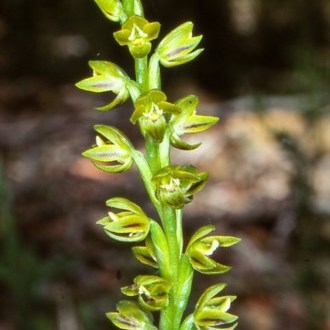
Current Estimated Numbers: 28 – 33
Location (Range): Various Hawaiian Islands – Alaka‘i Wilderness Preserve, Kaua‘i; Kamakou Preserve, Moloka‘i; Hanaula West Maui Forest Reserve, Waikamoi Preserve, and Kapunakea Preserve in Maui
Scientific Name: Peristylus holochila
Conservation Status: Critically Endangered (CR)
The Hawaiian Bog Orchid is the rarest orchid species native to Hawaii. During the last count in 2011, there were only 33 Hawaiian Bog Orchids found in the wild across three islands in Hawaii. The biggest threat to the Hawaiian Bog Orchid has been habitat destruction by humans and domestic and feral animals. This rare Hawaiian orchid is also threatened by invasive non-native species of plants. Although the Hawaiian Bog Orchid has become increasingly rare in the wild, there are currently ongoing conservation efforts. In recent years, conservationists have been growing Hawaiian Bog Orchid seedlings and re-planting them in the wild. Conservationists hope that the seedlings can survive long term and stabilize the Hawaiian Bog Orchid population.
Zeuxine rolfiana
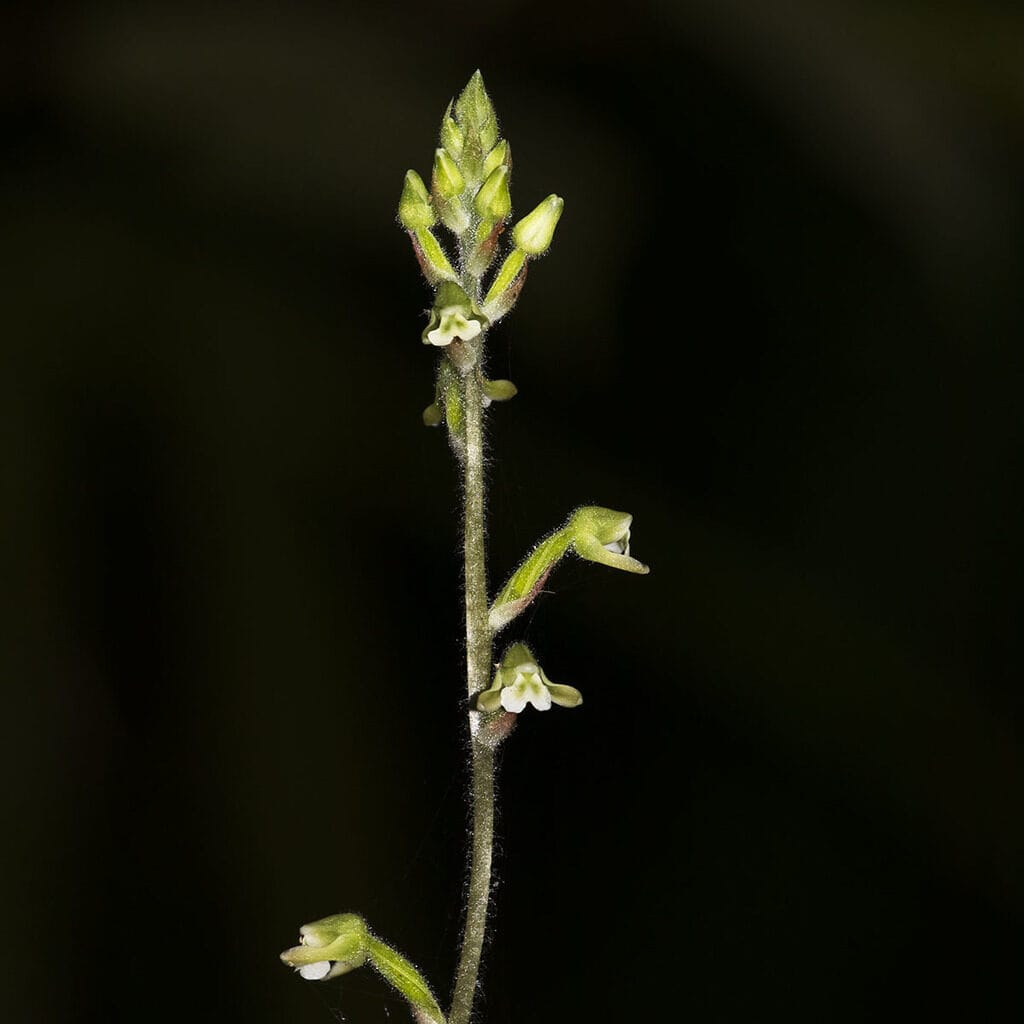
Current Estimated Numbers: about 18
Location (Range): Mount Harriet, South Andaman Island, India
Scientific Name: Zeuxine rolfiana
Conservation Status: Critically Endangered (CR)
The Zeuxine rolfiana was only rediscover in the wild 2010 after only being known from records from over 121 years ago. While finding the actual plants is significant, unfortunately researchers only found about 18 sterile Zeuxine rolfiana. With so few individuals left and no signs that the remaining plants will reproduce, the Zeuxine rolfiana is the rarest orchid in the world. The team of researchers from 2010 did collect three specimens of Zeuxine rolfiana and brought them back to the Botanical Garden of St. Joseph’s College in Kozhikode, Kerala, India. The orchids did end up flowering at the gardens, but died not long after. The Zeuxine rolfiana‘s habitat is greatly threatened by extensive construction in the area.
This article originally appeared on Rarest.org.
More from Rarest.org
10 Rarest Elements in the Universe
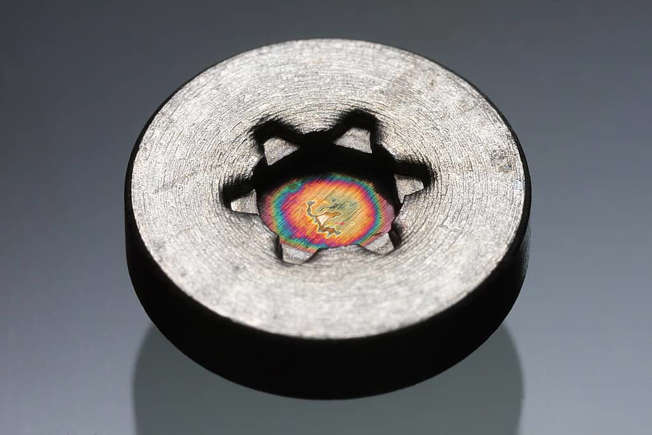
Within the vast expanse of the universe lie elements that are exceedingly rare, elusive, and intriguing. From radioactive isotopes to fleeting traces found in ores, these elements capture the imagination of scientists and enthusiasts alike. Read More
14 Rarest Mustang Models Ever Released

The Ford Mustang has long been an icon of American automotive history, known for its performance, style, and cultural significance. Throughout its storied history, Ford has produced numerous Mustang variants, but some stand out as exceptionally rare and coveted by collectors. Read More
1934 Mercury Dime Value Guide
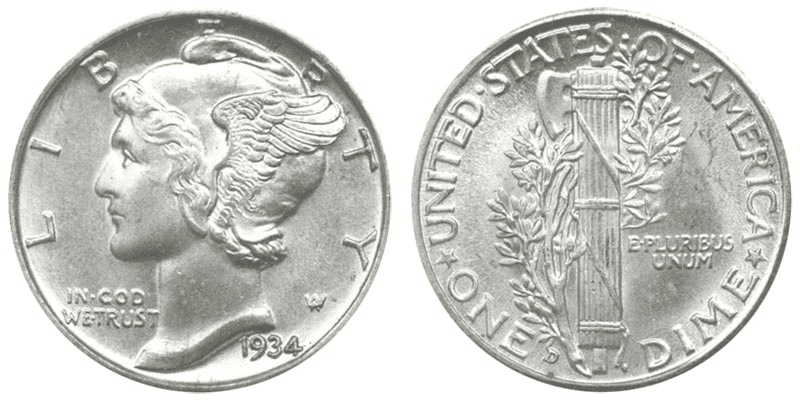
The Mercury Dime, despite its small size, might be the most elegant coin the US Mint has ever produced. It is very amazing that a coin this little could have such a complex and beautiful design. Read More
